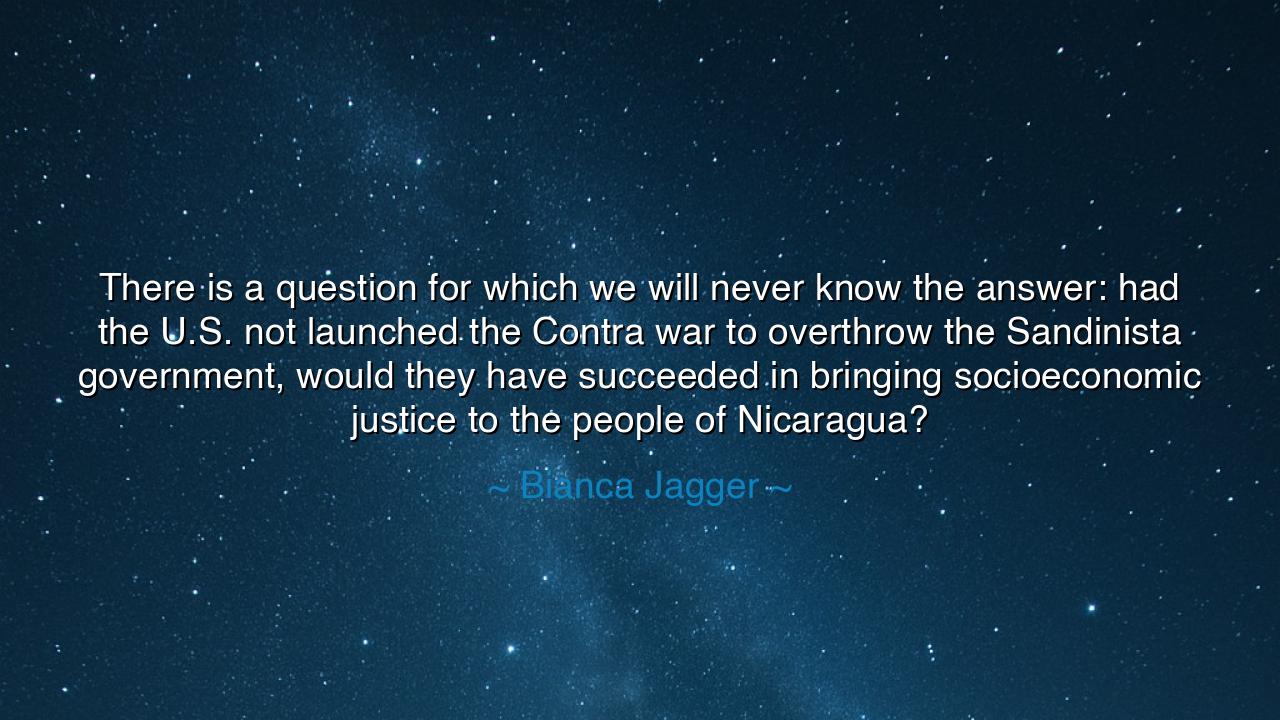
There is a question for which we will never know the answer: had
There is a question for which we will never know the answer: had the U.S. not launched the Contra war to overthrow the Sandinista government, would they have succeeded in bringing socioeconomic justice to the people of Nicaragua?






When Bianca Jagger spoke the words, “There is a question for which we will never know the answer: had the U.S. not launched the Contra war to overthrow the Sandinista government, would they have succeeded in bringing socioeconomic justice to the people of Nicaragua?” she was not only mourning the past — she was lamenting the eternal wound of interference, the tragedy of what might have been if justice had been allowed to take its natural course. Her words rise like a dirge over the graves of countless hopes, buried not by failure but by the violence of interruption. In them echoes the anguish of a people robbed of their destiny, and the sorrow of a world forever questioning the line between help and harm.
The Sandinista Revolution of Nicaragua began as a cry for liberation. For decades, the Somoza dictatorship had ruled through fear, corruption, and cruelty. In 1979, the Sandinistas — a movement born of the poor, the students, the workers, and the peasants — overthrew that tyranny and promised “socioeconomic justice”, a new dawn for the oppressed. Theirs was not merely a political revolt but a spiritual awakening — an attempt to build a nation where dignity, education, and fairness might finally prevail. Yet, as Jagger reminds us, history’s mercy was brief. The U.S. government, fearing the rise of leftist influence in its hemisphere, funded and armed the Contras, igniting a brutal civil war that tore Nicaragua apart.
This is the heart of Jagger’s sorrow — that we shall never know what the Sandinistas might have achieved had their dream not been strangled in its infancy. Perhaps they would have faltered under their own contradictions; perhaps they would have triumphed and given the world a new model of justice. But war has a way of erasing possibilities. It destroys not only lives, but futures. It devours the fragile hope of progress, leaving only ashes and speculation. The question she poses — unanswerable yet haunting — stands as a monument to lost potential, to the millions of unseen roads that violence forever closes.
Throughout history, this pattern repeats: the dreamers of justice rise, only to be crushed by the fear of those who cling to control. In Chile, Salvador Allende’s vision of a democratic socialism was ended by tanks and bombs in 1973. In Iran, the Mossadegh government’s national reforms were undone by foreign interference in 1953. In each case, the question remains — what might have been? Could the poor have prospered? Could equality have taken root? These are the questions that history refuses to answer, because the answers were burned away before they could bloom.
Bianca Jagger, herself Nicaraguan-born, speaks as one who has seen both the glory of revolution and the ruin of war. Her reflection is not an attack upon one nation, but a plea for moral accountability. She asks us to consider how easily ideals are crushed beneath the machinery of geopolitics, how swiftly compassion can be traded for control. Her tone is not that of hatred but of mourning — mourning for humanity’s recurring blindness, for the endless cycles of intervention that prevent the natural growth of justice among the nations of the earth.
There is wisdom in her lament. For it teaches that justice cannot be imported at gunpoint, nor can freedom be imposed by those who fear another’s autonomy. True justice must rise from within — from the soil, the soul, and the struggle of a people. When outsiders impose their will upon that process, they do not shape destiny; they shatter it. The tragedy of Nicaragua thus becomes the tragedy of humankind: that we too often destroy what we do not understand, and deny others the chance to prove that they could have built something better.
The lesson, then, is both humble and profound. We must learn to let others walk their own path to justice, even if it differs from our own. We must respect the right of nations, communities, and individuals to find their own equilibrium, to fail and to rise again without the shadow of domination. And within our own lives, we must beware of the same impulse — the desire to control the journey of others out of fear or pride. For in every interference lies the death of discovery, and in every act of domination, the loss of what might have been.
So remember Bianca Jagger’s words as a prayer and a warning: there will always be questions we will never answer, because we chose the sword over patience, the illusion of control over the quiet labor of understanding. Let future generations not repeat this error. Let them protect the fragile miracle of possibility — for in that space of freedom lies the only soil where true socioeconomic justice can ever grow.






AAdministratorAdministrator
Welcome, honored guests. Please leave a comment, we will respond soon